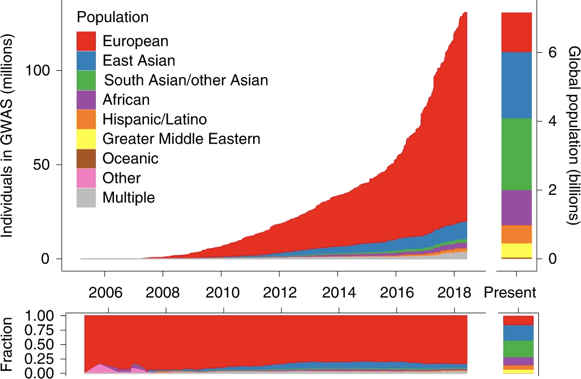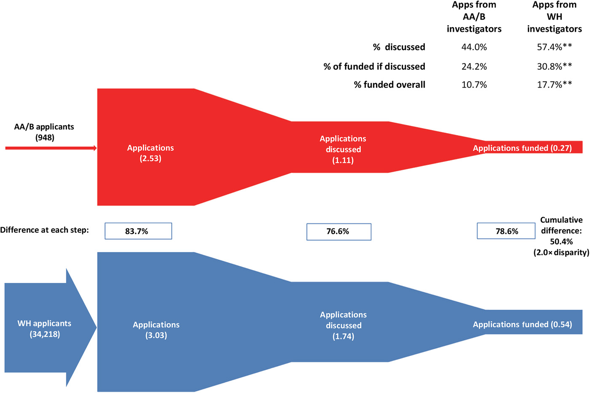Hi everyone! I am so thrilled to spend my #DNADay2020 with you. I would like to thank @kstsosie and the entire @DecolonizeDNA team for putting together this awesome lineup.
The title of my talk is "Making Genetics Accessible to African descendants through the lens of Black Culture". Here is a quick summary of what I plan to discuss in regard to this.
1) Need
2) How
3) Impact
4) Future
1) Need
2) How
3) Impact
4) Future
NEED:
Right now there is a lack of diversity in human genomics research, and majority of #GWAS are performed in non-European populations.
@genetisaur https://doi.org/10.1038/s41588-019-0379-x
https://doi.org/10.1038/s... href="https://twtext.com//hashtag/DecolonizeDNA"> #DecolonizeDNA
Right now there is a lack of diversity in human genomics research, and majority of #GWAS are performed in non-European populations.
@genetisaur https://doi.org/10.1038/s41588-019-0379-x
In order to improve health outcomes we need diversity.
But in order to increase diversity for participation/engagement in research studies, interests in STEM education and thus diversify the research workforce we need to make genetics accessible.
#DecolonizeDNA
But in order to increase diversity for participation/engagement in research studies, interests in STEM education and thus diversify the research workforce we need to make genetics accessible.
#DecolonizeDNA
So you might be wondering, why isn’t accessible? I mean we all have access to the same internet and resources. WRONG!
2011–2015, AA/B scientists submitted R01 applications at 83.7% the frequency of WH applicants
#DecolonizeDNA
doi:10.1126/sciadv.aaw7238
2011–2015, AA/B scientists submitted R01 applications at 83.7% the frequency of WH applicants
#DecolonizeDNA
doi:10.1126/sciadv.aaw7238
Science has been traditionally taught through a White male lens all the way down to the words we use to teach science to the process in which grants are awarded by funding agencies. All of which are impacted by systemic racism making science inaccessible to non-Euro populations.
I, myself, throughout my career have had to assimilate to whiteness in order to learn and excel in my career, most times subconsciously.
#DecolonizeDNA
#DecolonizeDNA
However, as I have grown into my own consciousness I began to realize just problematic and painful this and that we need to #DecolonizeDNA not only so scientist like myself embrace their true authenticity but because if we don’t the future of genomics will remain white.
In 2018 I was the winner of @Spotify’s Sound Up Bootcamp, selected 1 of 3 from a pool of 18,000. https://www.elle.com/culture/a22074514/spotify-sound-up-bootcamp-winners/">https://www.elle.com/culture/a...
Up until this point I had never thought about becoming a podcaster but it became crystal clear that this was an opportunity to #decolonizeDNA by educating and entertaining my community about what I love genetics.
In Those Genes is a podcast that uses genomics to decode the lost histories & futures of African descendants. Our overall goal to build trust btwn the Black comm and the genetics comm thru exposure & education from an expert geneticist who is also a member of these communities.
We make genetics accessible through the lens of Black culture. Our show has three segments, Genes for the Culture, Cracking the Code and Gene Therapy.
#decolonizeDNA http://www.inthosegenes.com"> http://www.inthosegenes.com
#decolonizeDNA http://www.inthosegenes.com"> http://www.inthosegenes.com
HOW
Today I am going to give an examples of how we make genetics more accessible by teaching through the lens of Black culture.
#decolonizeDNA http://www.inthosegenes.com"> http://www.inthosegenes.com
Today I am going to give an examples of how we make genetics more accessible by teaching through the lens of Black culture.
#decolonizeDNA http://www.inthosegenes.com"> http://www.inthosegenes.com
This example comes from our Kinship, Skinship Ep. on #Blackowned genetic ancestry testing companies how these companies determine your tribe through the elements of a hip hop song. https://player.audiostaq.com/inthosegenes/skinfolk_kinfol">https://player.audiostaq.com/inthosege...
Every hip hop song has four core elements.
1)The Beat
2)The hook
3)The bridge,
4)The verse.
And these companies are listening to your song by way of DNA.
https://player.audiostaq.com/inthosegenes/skinfolk_kinfol
https://player.audiostaq.com/inthosege... href="https://twtext.com//hashtag/decolonizeDNA"> #decolonizeDNA http://www.inthosegenes.com"> http://www.inthosegenes.com
1)The Beat
2)The hook
3)The bridge,
4)The verse.
And these companies are listening to your song by way of DNA.
https://player.audiostaq.com/inthosegenes/skinfolk_kinfol
Let& #39;s take the beat when the beat drops. It& #39;s the heart of the song. Think of this as a continental population. In our case it& #39;s Africa. Meaning everyone with African ancestry within the past 100 to 200 thousand years has the same beat.
https://player.audiostaq.com/inthosegenes/skinfolk_kinfol
https://player.audiostaq.com/inthosege... href="https://twtext.com//hashtag/decolonizeDNA"> #decolonizeDNA
https://player.audiostaq.com/inthosegenes/skinfolk_kinfol
Then comes the hook. The hook is a bit more specific. So we& #39;re gonna compare that to something we call subcontinental ancestry. You see everyone having the same subcontinental ancestry has the same hook in this song
https://player.audiostaq.com/inthosegenes/skinfolk_kinfol
https://player.audiostaq.com/inthosege... href="https://twtext.com//hashtag/decolonizeDNA"> #decolonizeDNA http://www.inthosegenes.com"> http://www.inthosegenes.com
https://player.audiostaq.com/inthosegenes/skinfolk_kinfol
We know that by the Beat the person is from Africa and in the hook we learn specifically they& #39;re from West Africa. We can even narrow it down to geographical location like Ghana, for example.
https://player.audiostaq.com/inthosegenes/skinfolk_kinfol
https://player.audiostaq.com/inthosege... href="https://twtext.com//hashtag/decolonizeDNA"> #decolonizeDNA http://www.inthosegenes.com"> http://www.inthosegenes.com
https://player.audiostaq.com/inthosegenes/skinfolk_kinfol
Then we get to the verse. In the verse we learn a lot about the M.C. and the song. There is a deeper story. We can even think of the verse in this context of being indicative of a tribe or ethnic group.
https://player.audiostaq.com/inthosegenes/skinfolk_kinfol
https://player.audiostaq.com/inthosege... href="https://twtext.com//hashtag/decolonizeDNA"> #decolonizeDNA http://www.inthosegenes.com"> http://www.inthosegenes.com
https://player.audiostaq.com/inthosegenes/skinfolk_kinfol
For our purposes individuals with the same verse share even more similarities of the song. Using the same example if we know the hook is West African we can use more genetic information to determine specific tribes like Ashanti or Fante.
https://player.audiostaq.com/inthosegenes/skinfolk_kinfol
https://player.audiostaq.com/inthosege... href="https://twtext.com//hashtag/decolonizeDNA"> #decolonizeDNA
https://player.audiostaq.com/inthosegenes/skinfolk_kinfol
Individuals who share the same verse are a part of the same tribe. People who share the same beat hook and verse might also have the same bridge. Which really makes the song unique. We can consider participants who share the same bridge -- kinfolk.
#decolonizeDNA
#decolonizeDNA
Now what about individuality. What makes you you. Someone you are closely related to, like a sibling, might share the same beat, hook, verse, and even a bridge as you.
https://player.audiostaq.com/inthosegenes/skinfolk_kinfol
https://player.audiostaq.com/inthosege... href="https://twtext.com//hashtag/decolonizeDNA"> #decolonizeDNA http://www.inthosegenes.com"> http://www.inthosegenes.com
https://player.audiostaq.com/inthosegenes/skinfolk_kinfol
Well, we can typically identify a specific rapper through their adlib. Don& #39;t you our love ad libs?! You know those random noises rappers make.
The ad libs in your DNA are what make you, you.
https://player.audiostaq.com/inthosegenes/skinfolk_kinfol
https://player.audiostaq.com/inthosege... href="https://twtext.com//hashtag/decolonizeDNA"> #decolonizeDNA http://www.inthosegenes.com"> http://www.inthosegenes.com
The ad libs in your DNA are what make you, you.
https://player.audiostaq.com/inthosegenes/skinfolk_kinfol
IMPACT-
In Those Genes has been used as an educational resource to teach genomics to a wide array of students. Below is a quick story (although we have many) of how the podcast is making genetics more accessible by students.
#decolonizeDNA
In Those Genes has been used as an educational resource to teach genomics to a wide array of students. Below is a quick story (although we have many) of how the podcast is making genetics more accessible by students.
#decolonizeDNA
Several weeks ago a listener let us know that she had been using our show to teach her Genetics and Evolution class at Stateville Prison (a maximum security men& #39;s prison) in Hill Crest IL.
#decolonizeDNA
#decolonizeDNA
They are SO excited about our show and even taught their professor the & #39;In Those Genes& #39; reference,LOL! They loved the show so much that the professor brings in every part of the show so that she can incorporate it into the lessons, she even prints out the Henrietta Facts we post.
Unfortunately, the students don& #39;t have access to the audio that accompanies our show but they have been reading our transcripts.
#decolonizeDNA
#decolonizeDNA
We were so moved mostly because the podcast was being used to educate a community often forgotten and most importantly that our content was accessible to the student population given the cultural connections we use to teach.
#decolonizeDNA
#decolonizeDNA
After the professor reached out to us, we have been sharing all information with them including slide decks, uncleaned transcripts, and audio files.
#decolonizeDNA
#decolonizeDNA
They loved the show so much that the professor incorporates every part of the show plus some of our social media posts into her lessons. Unfortunately, the students don& #39;t have access to the audio that accompanies our show but they have been reading our transcripts.
We were so moved by hearing this. And happy to hear that the podcast is an accessible, culturally relevant resource that being used to educate a community often forgotten.
#decolonizeDNA
#decolonizeDNA
Since the professor reached, we have been sharing all information with them including slide decks, uncleaned transcripts, and audio files.
#decolonizeDNA
#decolonizeDNA
In addition to being a @Spotify Bootcamp Winner, @inthosegenespod has been featured in the @nytimes as a podcast worth a listen and @InsidePodcstng
#DecolonizeDNA
https://www.nytimes.com/2020/03/08/arts/podcasts-worth-a-listen-fiasco-unwell-in-those-genes.html">https://www.nytimes.com/2020/03/0... https://inside.com/campaigns/inside-podcasting-19930?token=wBYMWgp2JCbKPAl-DKQ-bw">https://inside.com/campaigns...
#DecolonizeDNA
https://www.nytimes.com/2020/03/08/arts/podcasts-worth-a-listen-fiasco-unwell-in-those-genes.html">https://www.nytimes.com/2020/03/0... https://inside.com/campaigns/inside-podcasting-19930?token=wBYMWgp2JCbKPAl-DKQ-bw">https://inside.com/campaigns...
You can follow us on Instagram and Twitter @inthosegenespod and support us with a one time donation or join our patreon through links below.
#DecolonizeDNA
https://www.patreon.com/inthosegenes ">https://www.patreon.com/inthosege... https://paypal.me/inthosegenes ">https://paypal.me/inthosege...
#DecolonizeDNA
https://www.patreon.com/inthosegenes ">https://www.patreon.com/inthosege... https://paypal.me/inthosegenes ">https://paypal.me/inthosege...
In closing, I want to thank @kstsosie and @LMGLandry and the many others that have really MADE inclusion a real thing through this Twitter conference #DecolonizeDNA. I could not think of a better way to spend my #DNADay2020

 Read on Twitter
Read on Twitter #DecolonizeDNA" title="NEED:Right now there is a lack of diversity in human genomics research, and majority of #GWAS are performed in non-European populations. @genetisaur https://doi.org/10.1038/s... href="https://twtext.com//hashtag/DecolonizeDNA"> #DecolonizeDNA" class="img-responsive" style="max-width:100%;"/>
#DecolonizeDNA" title="NEED:Right now there is a lack of diversity in human genomics research, and majority of #GWAS are performed in non-European populations. @genetisaur https://doi.org/10.1038/s... href="https://twtext.com//hashtag/DecolonizeDNA"> #DecolonizeDNA" class="img-responsive" style="max-width:100%;"/>



